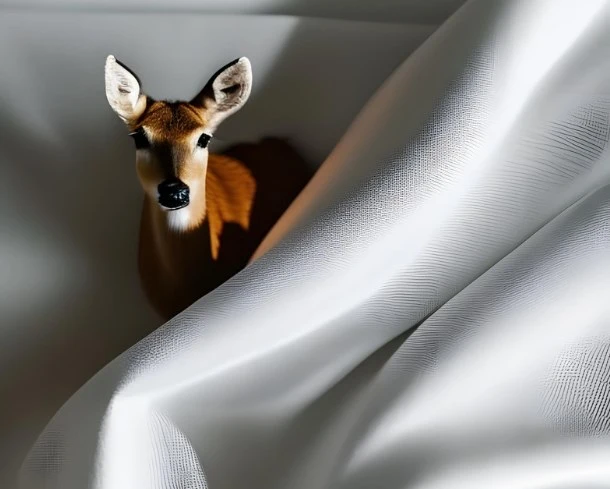Are deer intelligent? Many people have different opinions on this topic. Some may think that deer are dumb animals, while others believe they possess some level of intelligence. In this article, we will explore the question of whether or not deer are intelligent.
Deer are mammals and belong to the family Cervidae. They live in many parts of the world and can adapt to various environments, such as forests, mountains, and grasslands. Despite their prevalence in nature, there is still much debate about how intelligent these animals are. By researching their behaviors and abilities, we can understand more about these fascinating creatures’ intelligence. Are deer intelligent?
Examining Deer Behavior
Are Deer Intelligent? Deer are fascinating creatures that live in various habitats around the world. They have unique socialization patterns and can survive in different environments. However, hunting extensively impacts their population.
Deer socialization involves living in herds or alone while foraging for food. In a pack, they communicate through body language, scent marking, and vocalizations to establish dominance and maintain order within the group. On the other hand, solitary deer rely on camouflage as a defense mechanism against predators.
Hunting has led to a decline in deer populations over time. It disrupts their natural habitat and affects their breeding cycles. The loss of adult deer also weakens the social structure of their herds, which could lead to further declines in population numbers if not managed carefully.
Understanding Deer Communication
Are Deer Intelligent? Deer talk with each other in different ways. They use vocalizations like clicks, grunts, and whistles. They also use body language like stomping their hooves, flicking their tails, or turning their heads. All of this helps deer understand each other and show how smart they are!
Deer Vocalizations
Are Deer Intelligent? Have you ever heard a deer make a sound? It may surprise you to learn that they are pretty vocal creatures. Deer vocalization research has shown that these animals have a variety of communication patterns, including sounds for warning others of danger and calls to attract mates.
Communication patterns in deer can vary depending on the situation. For example, deer may stomp their hooves or loudly snort to alert other herd members when sensing danger. They also use high-pitched bleats to call out to each other if they become separated while grazing.
Are deer intelligent? Researchers have found that some types of deer vocalizations can convey information about an individual’s age, sex, and social status within the herd. This suggests that there is more complexity to deer communication than we might initially think. So next time you see a group of deer in the wild, listen closely—you might hear them chatting away!

Are deer intelligent? Deer Body Language
Are deer intelligent? Deer socialization is an essential aspect of their behavior. They communicate with each other not just through vocalizations but also through body language. Understanding deer body language can give us a better insight into how these animals interact with one another.
For example, when sensing danger, deer may freeze in place and raise their tail to signal to others that a predator is nearby. This behavior helps to warn the herd of potential threats and allows them to take evasive action if necessary.
Predators’ impact on deer socialization can be significant as well. Deer may exhibit different body language behaviors depending on the type of predator they encounter. For instance, when confronted by a pack of wolves, deer will often bunch together tightly and move quickly in unison. But when facing off against a solitary mountain lion, they may spread out more and keep a closer eye on their surroundings.
By paying attention to vocalizations and body language, we can better understand how deer communicate with each other. Whether warning others about predators or staying connected within the herd, these animals rely on complex communication patterns to survive in the wild.
Deer Memory And Learning Abilities
Are deer intelligent? Deers possess remarkable memory and learning abilities. They are known to have long-term memory and can recall specific locations after years of absence. For example, a deer may remember the site of a food source discovered in previous years.
Additionally, deer exhibit associative learning, which means they can associate certain stimuli with positive or negative outcomes. This allows them to learn from experience and adapt their behavior accordingly. For instance, if a deer has a negative encounter with humans, such as being chased by a hunter, it may become more cautious around people.
Cognitive flexibility is another skill that deer possess. They are adaptable creatures that can quickly adjust their behavior in response to changing environmental conditions. In times of drought or lack of food sources, for example, they often travel further distances than usual to find sustenance. These cognitive skills allow deer to survive and thrive in different environments.
- Four fascinating facts about Deer’s Memory and Learning Abilities:
- A fawn is born with a fantastic ability to memorize its mother’s scent within hours.
- Bucks remember the dominance hierarchy established during the rutting season year after year.
- Does teach their offspring critical survival skills through observation and practice.
- Some studies suggest that deer even have facial recognition capabilities!
With their impressive memory and learning abilities, it’s no surprise that many researchers believe deer possess problem-solving skills similar to those found in primates. How do these animals navigate complex problems? Let’s explore this topic next!
Are Deer Intelligent? Problem-Solving Skills In Deer
Have you ever wondered how deer solve problems? Do they use their instinct, or do they innovate to find solutions? Are deer intelligent? Deer problem-solving is a fascinating topic that scientists have studied for years. While some argue that it’s all about innate abilities, others believe experience plays a crucial role.
Researchers have examined deer’s problem-solving skills by setting up experiments where food is placed inside a container with a lid that can be opened using specific mechanisms. They found that while younger and inexperienced deer often struggle with these tasks, older ones who have seen similar containers are more likely to figure out how to open them quickly. This suggests that experience plays an essential part in how deer solve problems.
Moreover, studies show that deer tend to rely on their prior experiences rather than try something completely different when faced with new challenges. However, this doesn’t mean they’re not innovative thinkers! Research has shown that deer can develop creative solutions if traditional methods fail.
Spatial Awareness In Deer
Are deer intelligent? Deer have a remarkable spatial awareness that allows them to navigate through complex environments and avoid predators. Their ability to sense danger from afar is an essential aspect of their survival, and it’s one of the reasons why they’re considered intelligent animals.
Predator avoidance is crucial in deer’s lives as they face multiple daily threats. They’ve developed various strategies to evade predators, such as running away or hiding in dense vegetation. Additionally, they can detect danger using their senses, including sight, smell, and hearing.
Apart from predator avoidance, navigation strategies are also critical for deer. They often travel long distances throughout the year for food or better habitats. Deer use natural features such as streams and ridges to guide themselves during migration periods. Moreover, they have an incredible memory that helps them remember landmarks along their path.
- Did you know?
- Deer can jump up to 10 feet high.
- A group of deer is called a herd.
- Deer shed and regrow their antlers each year.
- Fawns can stand within half an hour after being born.
Overall, deer exhibit impressive intelligence when it comes to spatial awareness. They use various survival methods, such as predator avoidance and navigation strategies. Compared with other animals’ intelligence levels, deer’s unique abilities make them different creatures deserving admiration and respect.
Comparing Deer Intelligence To Other Animals
Are Deer Intelligent? Deer are intelligent creatures, but how do they compare to other animals? One way to look at this is by comparing deer intelligence to that of primates. Primates, like monkeys and apes, have been extensively studied for their cognitive abilities. They are known for their problem-solving skills, tool use, and social complexity. While it’s true that deer don’t display the same level of complex behaviors as primates, they still exhibit some impressive cognitive abilities.
Compared to other mammals, such as rodents or carnivores, deer have relatively high levels of intelligence. For example, researchers have found that deer are capable of spatial memory tasks and can recognize different individuals based on sight and scent. Additionally, studies have shown that deer can learn from experience and adjust their behavior accordingly. These findings suggest that deer are still highly adaptable animals with a range of cognitive abilities while not as advanced as primates in cognition.
Overall, it’s clear that deer possess a certain level of intelligence compared to other animals. While they may not be able to solve complex problems like primates can or perform feats of tool use, they still exhibit fascinating cognitive abilities that make them unique among mammals. The following section will explore how environmental factors can further influence these abilities.
The Influence Of Environment On Deer Intelligence
As we have seen in the previous section, deer intelligence can be compared to that of other animals. However, it is essential to consider the environment’s influence on deer intelligence.
Are deer intelligent? The impact of predators plays a significant role in shaping a deer’s cognitive abilities. Deer living in areas with high predator populations tend to develop heightened senses and quick reflexes as they must constantly be alert for danger. This type of environmental pressure leads to unique adaptations that improve their survival chances.
Another factor affecting deer intelligence is socialization. Research has shown that fawns raised by attentive mothers who teach them essential skills, such as finding food and avoiding danger, are more likely to grow up with higher levels of problem-solving ability than those without this guidance.
- Five ways the environment shapes deer intelligence:
- Predators
- Food availability
- Climate conditions
- Habitat fragmentation
- Human interference
In summary, while some may argue that deer are not particularly intelligent creatures, it is clear that their environment plays a vital role in shaping their cognitive development. The influence of predators and the part of socialization should not be overlooked when considering the intelligence of these majestic animals.
Looking toward the future of deer intelligence research, there is still much to discover about these fascinating creatures. We can gain valuable insights into animal behavior and ecological systems by studying how different environments affect their behavior and cognition.

The Future Of Deer Intelligence Research
Would you be surprised if I told you that deer are more intelligent than we thought? While it’s easy to assume these creatures are cute and harmless, researchers have uncovered evidence of their intelligence in recent years. The future of deer intelligence research looks bright as new technology allows us to delve deeper into their world.
Are deer intelligent? One area of study that has particularly piqued scientists’ interest is deer language. Yes, you read that right – these animals have complex communication systems that allow them to convey various messages to one another. By analyzing this language, researchers hope to gain insight into how deer think and interact with each other daily.
Another exciting development in deer intelligence research is the use of AI technology. With machine learning algorithms and advanced data analysis techniques, scientists can now gather vast information about deer behavior and cognition. This will undoubtedly lead to discoveries about these fascinating animals and may even provide valuable insights to help us better protect them in the wild.
| Pros | Cons |
|---|---|
| A deeper understanding of deer behavior | Expensive equipment needed for research |
| Potential benefits for conservation efforts | Limited funding available for studies |
| New opportunities for scientific exploration | Ethical considerations surrounding animal testing |
As we continue to learn more about the complexities of deer intelligence, one thing is sure: there’s still so much we don’t know yet. However, with cutting-edge technology at our fingertips and a growing interest in studying these remarkable creatures, the future looks bright for those who seek to unravel their mysteries. Who knows what kind of breakthroughs await us down the road?
Frequently Asked Questions
What Is The Average Lifespan Of A Deer?
Deer can live up to 20 years in the wild, but their lifespan is affected by various factors such as predation, disease, and habitat quality. Different deer species also have varying lifespans, with some living longer than others. For instance, mule deer and white-tailed deer typically live between 6-10 years, while elk can live for about 15 years. These differences may be due to genetics or environmental conditions where they reside. Overall, it’s important to note that a deer’s lifespan depends on many factors and varies across other species.
How Many Species Of Deer Are There?
There are around 50 species of deer in the world! They can live in different habitats, such as forests and grasslands. However, they must watch for predators like wolves, coyotes, and mountain lions. Some species of deer even migrate between different areas depending on the season.
What Is The Mating Season For Deer?
Deer have a particular time of year when they mate, called the mating season. During this time, male deer will compete with each other for the attention of female deer. They do this by making loud calls and showing off their antlers. The exact timing of the mating season can vary depending on where you live and what species of deer you are talking about. However, climate change is having an impact on deer breeding patterns in some areas. This means that the timing of the mating season may be changing too.
Do All Deer Migrate?
Do all deer migrate? Well, it depends on where they live and the environmental factors around them. Some deer species, like the white-tailed deer, are known to have migration patterns, while others don’t. For example, white-tailed deer in northern areas may move southwards when food is scarce during winter. This happens because they must find better grazing grounds with more abundant vegetation. However, not all environmental conditions force deer to migrate, as some species can adapt to seasonal changes without moving long distances.
Are Deer Intelligent? Can Deer Be Trained To Perform Certain Tasks?
Deers can be trained to perform specific tasks using different deer training techniques. It is important to consider ethical considerations in deer training, such as not causing harm or distress to the animal. Some examples of tasks that deer have been trained to do include jumping over obstacles and responding to commands from their trainers. Training a deer requires patience, consistency, and positive reinforcement. A deer can learn new behaviors and respond appropriately in different situations with proper training.
Conclusion
So, are deer intelligent? Well, we can’t measure intelligence in animals the same way we do with humans. But we know that deer have impressive survival instincts and adaptability to their environment.
Are deer intelligent? While it’s difficult to determine the exact level of intelligence in deer, there’s no denying that these fascinating creatures possess unique abilities and behaviors. Deer can live for an average of 6-8 years, with some living up to 20 years in captivity. With around 47 species of deer found worldwide, the mating season for these animals varies depending on the species and geographic location. While some deer species migrate, others prefer to stay in one place year-round. It’s possible to train deer to jump through hoops or walk on a leash, though this is not a common practice.
While we may not be able to say if deer are intelligent, they certainly have unique abilities and behaviors that make them fascinating creatures to observe and study!

